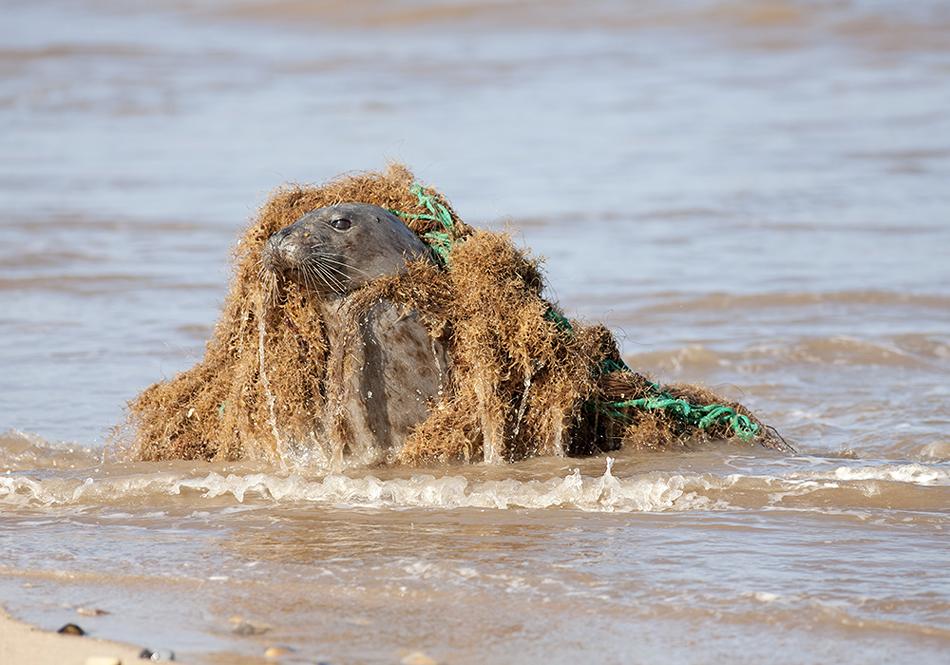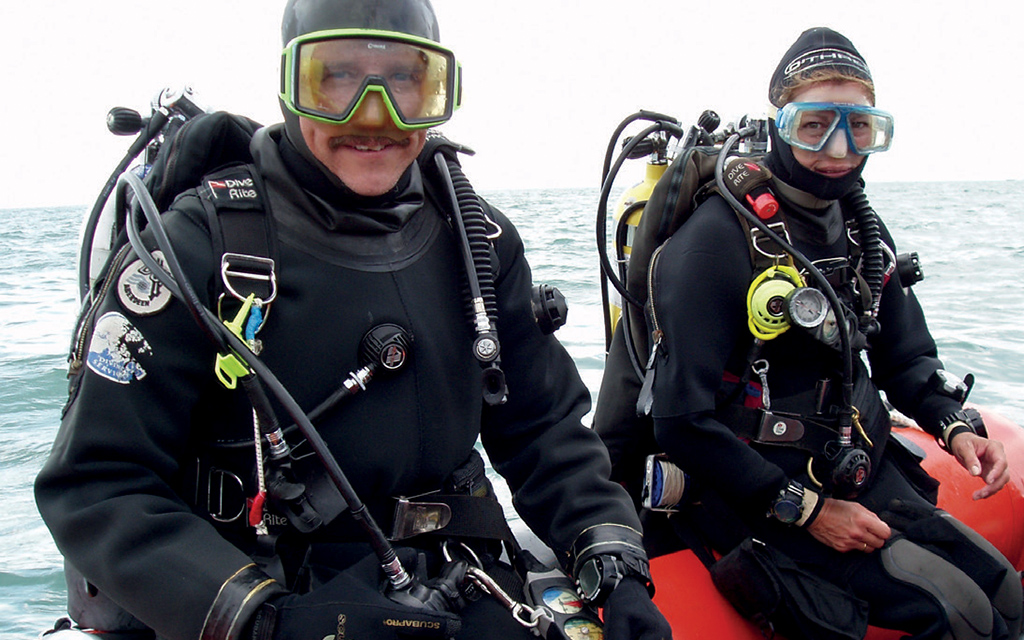
If your interest in diving is beginning to wane, nautical archaeology might just provide the challenge you need to keep things fresh. Interview by Kristina Pedder.
The Nautical Archaeology Sub Aqua Club (NASAC) exists to carry out diving with a purpose. Through its association with the Nautical Archaeology Society (NAS), you will find a range of skills training on offer and plenty of diving on historic sites, as well as access to a nautical archaeology library and highly experienced people in the field.
When was the club formed?
NASAC was formed by the NAS in 2011 to provide project-based archaeological diving opportunities for NAS members. The society and the club work together to enable people to learn about underwater archaeology and then get involved in fieldwork. Guests are welcomed by the club and can join club members for a maximum of five dives before joining. Membership has been growing; there are 28 members at present, all divers.
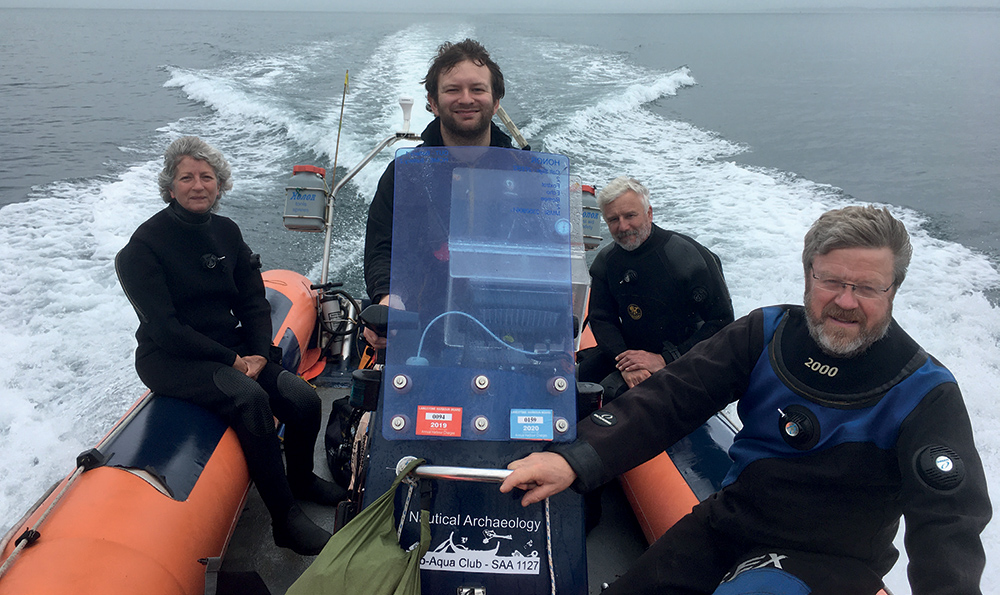
Where are you based?
The club is based in Fort Cumberland in Southsea, Portsmouth. The club RIB is also stored there. We used to hold regular meetings at Fort Cumberland, but only a few members were local enough to attend. One of the real positives to come out of the Covid pandemic for us was our move to meeting online. We set up monthly Zoom meetings on the second Thursday of each month and now more 50 per cent of our members join. The monthly get-together is a great forum for members to chat and make plans for future projects.
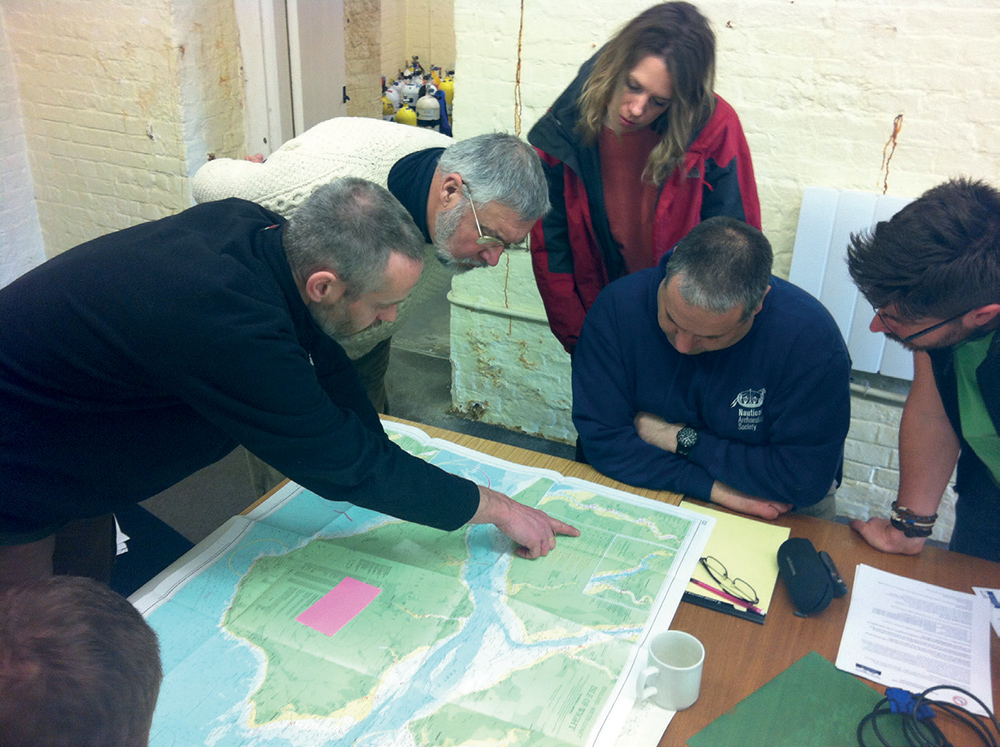
Who are your members?
This is a global club. Our members share a passion for nautical archaeology and they come from all over the world, reflecting the diversity of the society’s membership too. Most club members are in the UK, and they come together for dive trips taking place all over the country throughout the year. Our members are often also members of a local BSAC club where they live. They join our club as a second club to get involved in maritime archaeology.
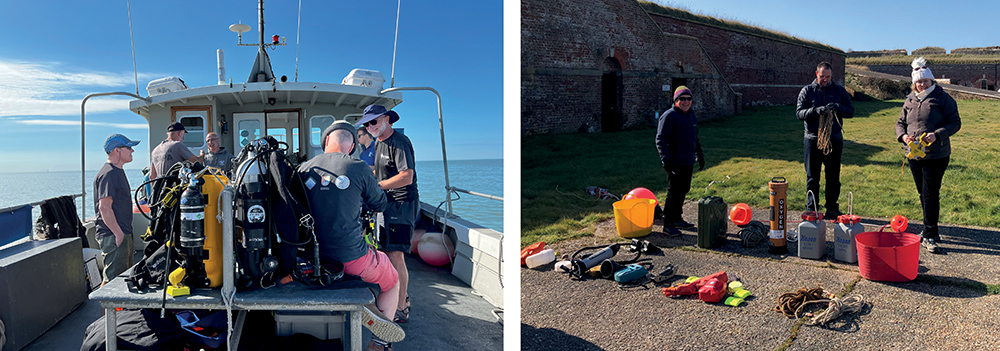
Are you a training club?
We don’t offer Diver Training Programme training; our divers come to us having done their dive training with BSAC clubs or other organisations. NASAC and the NAS focus on specific training for nautical archaeology. Of the BSAC Skill Development Courses, dive planning workshops and boat handling courses are popular.
What is the NAS training on offer?
The NAS has run courses for divers to learn how to document shipwrecks underwater for more than 30 years. Skills taught range from the simple-sounding taking accurate measurements underwater to more complex photogrammetry training, where multiple still images can be stitched together to produce a wide-angle view of an underwater site. The NAS also offers e-learning courses to do in your own time, starting with the Discover Maritime Archaeology course. You can find out more in the Education section of the NAS website.

How can divers get started?
A good starting point for divers is the two-day Underwater Skills Days course for qualified Sports Divers and above. There are 2023 dates planned at both Stoney Cove and Vobster quarries. The sites are chosen as controlled underwater environments unaffected by the weather. For many divers, using UW surveying techniques is their first exposure to having a task other than navigation to do on a dive. To facilitate the training, the society put the wreck of the Elizabethan merchant ship Gresham, first discovered in the river Thames in 2003, into Stoney Cove some 10 years ago to provide an underwater classroom. Last year, a shipwreck training site was created from scratch in Vobster. Sinking a fake wreck proved harder than you might think, but our second underwater classroom is now available, just past the aircraft cockpit if you know your way around Vobster.
NAS training enables divers to get involved in underwater fieldwork opportunities across the world, or to progress to investigate their own wreck site.
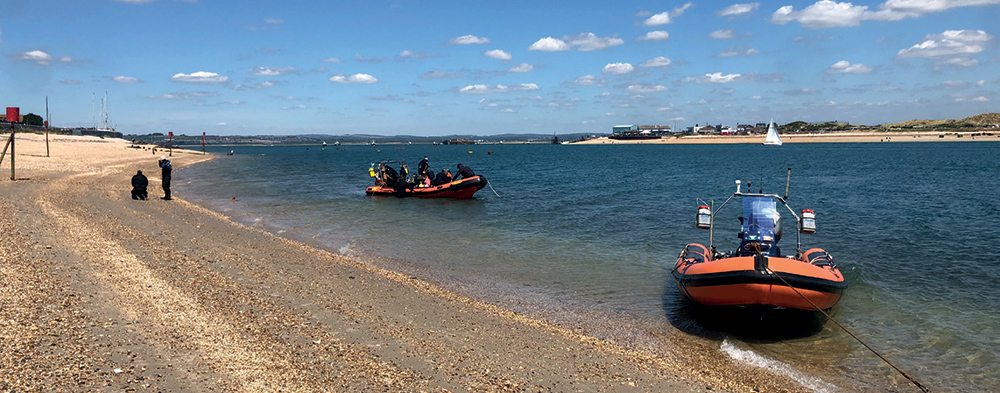
What resources does the club have?
One of our biggest resources is the unique nautical archaeological knowledge of our members. Club members can also access the NAS library of nautical records, maps and books and there is plenty of survey equipment available for loan for underwater archaeological studies and monitoring. We run a boat: a Deep Sea 21, 6.8-metre rigid-hulled inflatable called Honor, named after Honor Frost, an early pioneer in the field of underwater archaeology. We run an air compressor and keep some spare air cylinders for visiting divers.
Is it easy to look after your resources?
The NAS resources are maintained by the society. We do an annual pre-season check of our equipment dive kit and survey kit, which can be lent out to members. The main task for the club is to look after Honor. We pay for her upkeep from our membership income, and we are fortunate to have the skills and facilities of club members, who can do a large part of the maintenance themselves.
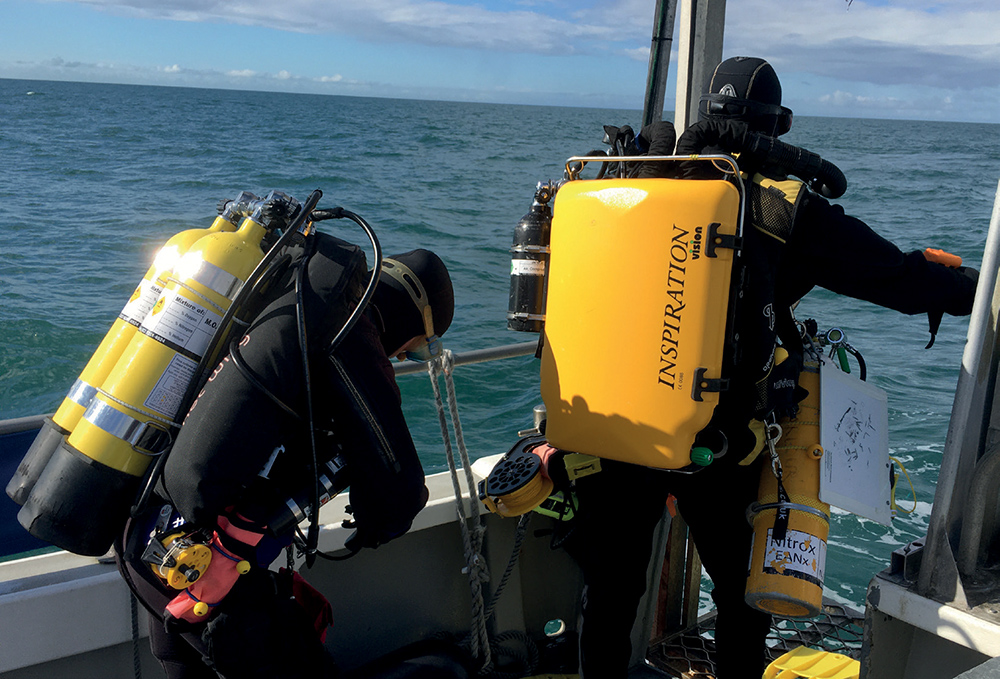
What diving do you get involved in?
We mostly dive along the South Coast from Plymouth to Eastbourne. Club members can book the RIB – we expect her to go on 12- 20 trips a year, mainly around the Portsmouth area or further afield in Sussex. We have taken the club boat to Devon and Pembrokeshire. Our diving is predominately recreational open-circuit diving from our RIB or charter boats, but we do have members who dive closed-circuit. Photography and photogrammetry are very useful skills. We also have social events, such as our barbecues, but despite trying every year they have a worse record of being cancelled by the weather than our dives do. The barbecue has been cancelled four out of five times in recent years!
How much club diving goes on?
We dive all year round. Our first dive in 2023 was in January. While club dives are often organised at a weekend, project dives are often mid-week. We organise around five weekends of diving, a couple of longer trips and about 40 day dives a year. We will visit anywhere that sparks members’ archaeological interests. Plymouth is a favourite. We have been restricted recently due to Covid, but we are planning to visit further afield locations such as Guernsey, Farne Islands, Scapa Flow and the Second World War shipwreck graveyard off Cape Hatteras in California in coming years. We also work with other clubs. In 2022, we hosted a visit from Chester BSAC, who brought their boat to dive HMS Invincible and the submarine A1 with us. And we helped the University of Southampton to give their diver trainees the experience of a RIB dive, by taking them to HMS Invincible. Licensees of protected wrecks are often our members and divers are welcome to contact us to find out about diving any protected site. We’ll do our best to help. We also organise Protected Wreck Days to dive various local sites.
Tell us about a recent project…
For the past few years, we’ve been working in secret on high-profile wreck identification project and have only recently released the details of the wreck named as the Klein Hollandia [see the March 2023 issue of SCUBA]. The fieldwork was done by NAS-trained divers, mostly our members, who surveyed it, videoed it, and finally helped to identify it.
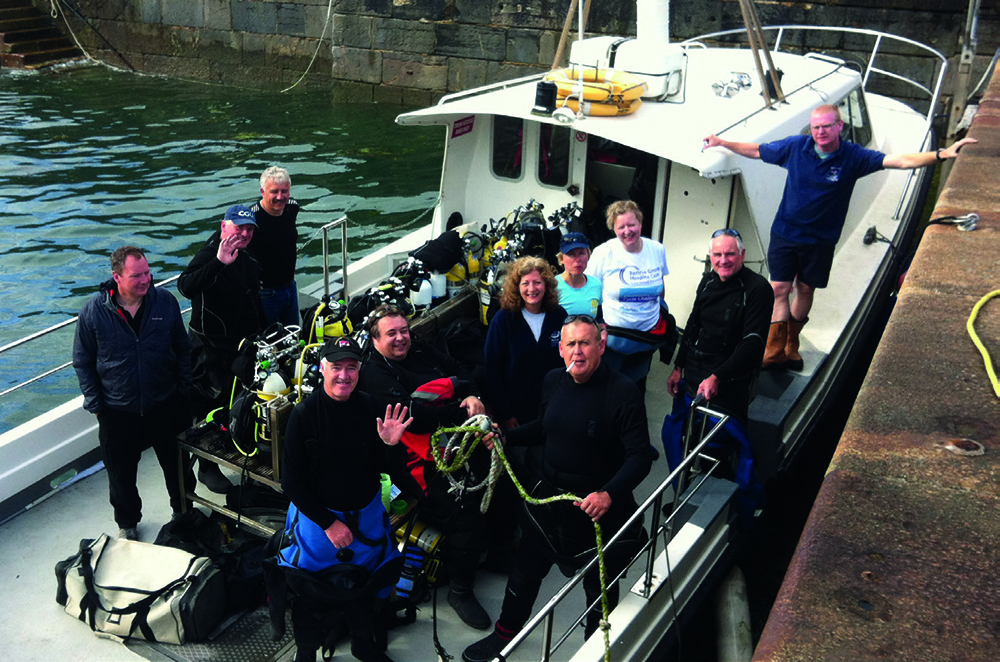
What else has the club achieved in the past year?
We have grown our club membership. Our membership and communications people have been brilliantly proactive in publicising our recent activities above and below water. We support the Save the London 1665 Campaign to help protect the 76-gun Navy ship sunk in tragic circumstances in 1665. It now lies in the murky waters of the Thames Estuary shipping lanes. Club member Alex Denny walked the Three Peaks in less than 24 hours, raising nearly £2,500, which was then matched by his employer making a grand total of £5,000 for the campaign.
How can readers find out more about the London?
The society holds an annual event on a date near to the day of its sinking, which happened on 7 March 1665. The 2023 event was the fourth one. You can see artefacts from the wreck at the Southend Central Museum and can donate to the campaign via the dedicated page on the NAS website.
What’s the club planning for the next few years?
We want to provide more diving opportunities for both members and non-members to visit historically important protected wrecks, including A1 and Holland 5 submarines. We also want to identify more historic wrecks: over the next few years we’ll be looking at a list of anomalies in the Solent, maybe we will find the next Mary Rose.
We also want to set up a monitoring programme on protected wreck sites including Norman’s Bay, Iona II, and Holland 5 and on the site of HMS Boxer, which has been adopted by a member. HMS Boxer was Britain’s oldest serving Destroyer when it sank in 1918. The sands on the site regularly move and reveal new artefacts. The site has never been surveyed using photogrammetry, but one of our members has taken on this challenge.
What’s your overriding mission?
We want to continue highlighting the opportunities for diving with a purpose to support nautical archaeology and the protection of our maritime heritage to as many people as we can. The society supports the diving club, and the club supports the society to get archaeological diving done.
This Club Focus was originally published in SCUBA magazine, Issue 135 May 2023. For more membership benefits, visit bsac.com/benefits.
Join the BSAC community
The BSAC network is working together to keep people connected to the sport. With online training, special interest webinars, competitions, support to clubs and the trade, and much more...we'd love you to join us.
Want to know more about the Nautical Archaeology Sub-Aqua Club? Please contact Mark Beattie-Edwards, Diving Officer via mark@nauticalarchaeologysociety.org or visit www.nauticalarchaeologysociety.org
Images in this online version may have been substituted from the original images in SCUBA magazine due to usage rights.




